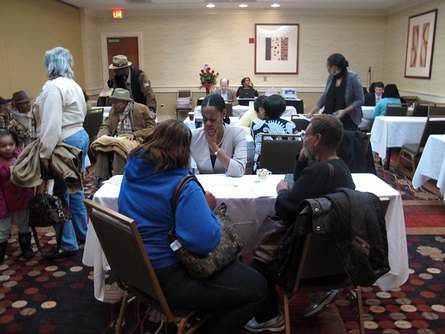
BLACK FARMERS and their relatives file claims applications in Memphis, Tenn. A settlement in a discrimination lawsuit pays farmers who were denied loans from 1981 to 1996. (ADRIAN SAINZ | ASSOCIATED PRESS PHOTOS), a photo by Pan-African News Wire File Photos on Flickr.
Federation of Southern Cooperatives
Land Assistance Fund
For Immediate Release: December 18, 2013
Contact: Heather Gray
heathergray@federation.coop
404 765 0991
www.federation.coop
Update from the Ombudsman in the Black Farmer Lawsuit
Note: We at the Federation, as well as other farm groups, have received calls from individuals wondering whether they can still get in the Black farmer lawsuits (phase one and two) and whether the lawsuit is opening up again. Because of this we want to provide farmers and others around the country with an update from the ombudsman in the lawsuit that explains the process and stating that the lawsuit is now closed. Please see the update below.
The Black Farmer Cases are Closed
I. Introduction and Summary
Two Black Farmer settlements have been approved by the courts. Both are now closed.
II. Two Black Farmer Settlements: Both Now Closed
Two Black Farmer Settlements have been approved by the federal court in Washington, D.C.
The deadline for filing a claim in the second case, known as In re Black Farmers Discrimination Litigation, was May 11, 2012. The deadline for the first case, known as Pigford, was in 2000.
It is no longer possible to join either of the cases.
III. Statute of Limitations Waiver is Closed
Both Black Farmer cases were made possible because Congress waived what is known as the statute of limitations for the cases. A statute of limitations is a legal term that helps set deadlines for filing a lawsuit. Without a waiver of the statute of limitations, there would be no Black Farmer settlements.
Some people are now saying that a statute of limitation of waiver passed by Congress is still in effect. That is not true. The congressional waiver of the statute of limitations for Black Farmer cases ended in 2010.[1]
IV. Paying Money to be Part of the Black Farmer Settlements
In both Black Farmer settlements, some people and organizations took money from the public in exchange for the promise of getting people into the settlements.
In both cases, no payment was needed to be a part of the settlement. The Ombudsman and Deputy Ombudsman have heard from hundreds of people who paid money to get into the Black Farmer settlements only to find out later that they were left out of those settlements.
Please beware of scams.
V. Contacting the Ombudsman and Reporting Scams
The Ombudsman and Deputy Ombudsman were appointed by Judge Paul L. Friedman of the United States District Court in Washington, D.C.
The job of the Ombudsman is to make sure that the settlement in the In re Black Farmers case is carried out according to the law.
If you feel you have been targeted for a scam regarding the Black Farmer settlements you can report the scam to the Ombudsman. You can also report scams at your state level. The Attorney General in your state is a good place to start.
There are three ways to contact the Ombudsman.
First, you can call toll-free at 1-866-686-8682.
Second, you can send an email at info@inreblackfarmersombudsman.com.
Third, you can write to:
Ombudsman
PO Box 19100
Washington, D.C. 20036.
The Ombudsman also has a website at www.inreblack farmersombudsman.com.
[1] The waiver of the statute of limitations lasted for two years beginning June 2008.
__________________________________
Ombudsman Role
The job of the Ombudsman is to learn about and try to solve problems with the implementation of the In re Black Farmers
settlement.
The Ombudsman cannot change the settlement itself. For example, under the settlement only people who made a written request to be a part of the Pigford lawsuit - the first Black Farmers case - can be a part of In re Black Farmers. That request must have been to the Pigford Monitor, Facilitator, Arbitrator, Adjudicator, or the Court. The In re Black Farmers Settlement Agreement sets this requirement, and the Ombudsman cannot change it.
The Ombudsman may be able to help a class member if there are problems with the way the settlement is being carried out or implemented. For example, if a class member has tried to sign up for a Class Counsel meeting to get help in filling out a Claim Form, but cannot get through to set up a meeting, that would be a problem with the way the settlement is being carried out, and the Ombudsman may be able to help.
Note: The Federation/LAF, now in its 46th year, assists Black family farmers across the South with farm management, debt restructuring, alternative crop suggestions, marketing expertise and a whole range of services to ensure family farm survivability.
2769 Church Street · East Point, GA · 30344
404 765 0991 · www.federation.coop
No comments:
Post a Comment